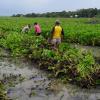If you are reading this and are from North America (and perhaps even if you aren't), you are no doubt aware of just how divisive the issue of climate change is in the US and Canada. Experts from both sides of the issue are regular installments on the 24-hour news networks, presenting the latest data in favor of or disputing the warming of the planet. Policy experts offer the pros and cons of legislation aimed at cutting greenhouse gas emissions. Lawmakers debate possible action steps. Facebook posts supporting or refuting climate change turn into hotbeds of political (and sometimes a little bit of personal) attacks. Friends bicker; family relationships are strained.
This is simply the reality of the political climate in North America, but the existence of such rigorous debate is not unfounded. If warming trends continue the way that scientists are currently projecting (4 degrees Celsius by the end of the century), things in North America won't look all that different. We'll probably experience more droughts, our growing zones will shift, and Michigan will have the climate of Tennessee. Even if things do get bad in North America, we have the money and technology necessary to adapt fairly well to any changes in weather patterns or growing seasons that we might experience. In short: North America can afford not to worry about climate change—at least for a while.
But what will happen to other parts of the world if warming continues at the rate projected? The predictions are staggering: the inundation of coastal cities; increasing risks for food production, potentially leading to higher malnutrition rates; many dry regions becoming drier and wet regions wetter; unprecedented heat waves in many regions, especially in the tropics; substantially exacerbated water scarcity in many regions; increased frequency of high-intensity tropical cyclones; and irreversible loss of biodiversity, including coral reef systems. A recent report commissioned by the World Bank Group identifies some of the most vulnerable cities as being in Mozambique, Madagascar, Mexico, Venezuela, India, Bangladesh, Indonesia, the Philippines and Vietnam. In short: utter catastrophe for much of the Global South.
So how do we explain the existence of such ambivalence in North America toward climate change in the face of such shocking predictions? I believe that part of the answer is that we have the privilege of skepticism. We have been largely shielded from the effects of a warming world. As such, we have the freedom to debate the existence of the climate disruption that scientists are telling us about. "I don't see any substantial changes to weather patterns. Are we sure this is really happening?"
Something I've been struck by during my time in Kenya so far is that a changing climate isn't a debate in Kenya; it is a daily reality. It is a daily reality for the farmers we talked to who can no longer predict the rains and do not know when to plant their crops. It is a daily reality for villagers whose centuries-long river-fed water supplies are dwindling ever lower by the day.
There is no doubt the debate over climate change will continue to rage in North America for some time to come. Figures will be cited, studies will be pointed to, voices will be raised. As long as we continue to be largely sheltered from the effects of a warming world, doubt will infuse our public discourse. But as we continue to exercise our privilege of skepticism, people in Kenya—and in other vulnerable places around the globe—will continue to pay the price of our ambivalence. Because make no mistake: inaction costs something. We just aren't the ones that are paying for it.
[Photo: flickr user CIAT International Center for Tropical Agriculture]




The Reformed family is a diverse family with a diverse range of opinions. Not all perspectives expressed on the blog represent the official positions of the Christian Reformed Church. Learn more about this blog, Reformed doctrines, and our diversity policy on our About page.
In order to steward ministry shares well, commenting isn’t available on Do Justice itself because we engage with comments and dialogue in other spaces. To comment on this post, please visit the Christian Reformed Centre for Public Dialogue’s Facebook page (for Canada-specific articles) or the Office of Social Justice’s Facebook page. Alternatively, please email us. We want to hear from you!
Read more about our comment policy.